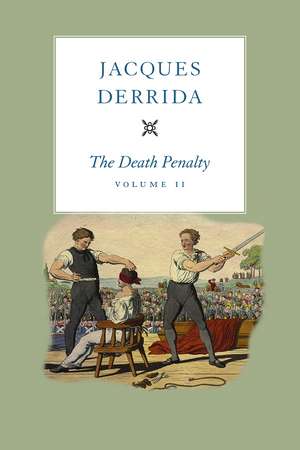The Death Penalty, Volume II: The Seminars of Jacques Derrida
Autor Jacques Derrida Traducere de Elizabeth Rottenbergen Limba Engleză Hardback – 3 aug 2017
In the first volume of his extraordinary analysis of the death penalty, Jacques Derrida began a journey toward an ambitious end: the first truly philosophical argument against the death penalty. Exploring an impressive breadth of thought, he traced a deeply entrenched logic throughout the whole of Western philosophy that has justified the state’s right to take a life. He also marked literature as a crucial place where this logic has been most effectively challenged. In this second and final volume, Derrida builds on these analyses toward a definitive argument against capital punishment.
Of central importance in this second volume is Kant’s explicit justification of the death penalty in the Metaphysics of Morals. Thoroughly deconstructing Kant’s position—which holds the death penalty as exemplary of the eye-for-an-eye Talionic law—Derrida exposes numerous damning contradictions and exceptions. Keeping the current death penalty in the United States in view, he further explores the “anesthesial logic” he analyzed in volume one, addressing the themes of cruelty and pain through texts by Robespierre and Freud, reading Heidegger, and—in a fascinating, improvised final session—the nineteenth-century Spanish Catholic thinker Donoso Cortés. Ultimately, Derrida shows that the rationality of the death penalty as represented by Kant involves an imposition of knowledge and calculability on a fundamental condition of non-knowledge—that we don’t otherwise know what or when our deaths will be. In this way, the death penalty acts out a phantasm of mastery over one’s own death.
Derrida’s thoughts arrive at a particular moment in history: when the death penalty in the United States is the closest it has ever been to abolition, and yet when the arguments on all sides are as confused as ever. His powerful analysis will prove to be a paramount contribution to this debate as well as a lasting entry in his celebrated oeuvre.
Of central importance in this second volume is Kant’s explicit justification of the death penalty in the Metaphysics of Morals. Thoroughly deconstructing Kant’s position—which holds the death penalty as exemplary of the eye-for-an-eye Talionic law—Derrida exposes numerous damning contradictions and exceptions. Keeping the current death penalty in the United States in view, he further explores the “anesthesial logic” he analyzed in volume one, addressing the themes of cruelty and pain through texts by Robespierre and Freud, reading Heidegger, and—in a fascinating, improvised final session—the nineteenth-century Spanish Catholic thinker Donoso Cortés. Ultimately, Derrida shows that the rationality of the death penalty as represented by Kant involves an imposition of knowledge and calculability on a fundamental condition of non-knowledge—that we don’t otherwise know what or when our deaths will be. In this way, the death penalty acts out a phantasm of mastery over one’s own death.
Derrida’s thoughts arrive at a particular moment in history: when the death penalty in the United States is the closest it has ever been to abolition, and yet when the arguments on all sides are as confused as ever. His powerful analysis will prove to be a paramount contribution to this debate as well as a lasting entry in his celebrated oeuvre.
Din seria The Seminars of Jacques Derrida
-
 Preț: 200.40 lei
Preț: 200.40 lei -
 Preț: 201.21 lei
Preț: 201.21 lei -
 Preț: 302.48 lei
Preț: 302.48 lei -
 Preț: 170.58 lei
Preț: 170.58 lei -
 Preț: 293.38 lei
Preț: 293.38 lei -
 Preț: 182.98 lei
Preț: 182.98 lei -
 Preț: 326.25 lei
Preț: 326.25 lei -
 Preț: 302.45 lei
Preț: 302.45 lei -
 Preț: 184.74 lei
Preț: 184.74 lei - 20%
 Preț: 223.48 lei
Preț: 223.48 lei
Preț: 259.12 lei
Preț vechi: 326.67 lei
-21% Nou
Puncte Express: 389
Preț estimativ în valută:
49.58€ • 51.90$ • 41.27£
49.58€ • 51.90$ • 41.27£
Carte indisponibilă temporar
Doresc să fiu notificat când acest titlu va fi disponibil:
Se trimite...
Preluare comenzi: 021 569.72.76
Specificații
ISBN-13: 9780226410821
ISBN-10: 022641082X
Pagini: 304
Dimensiuni: 152 x 229 x 25 mm
Greutate: 0.54 kg
Ediția:1
Editura: University of Chicago Press
Colecția University of Chicago Press
Seria The Seminars of Jacques Derrida
ISBN-10: 022641082X
Pagini: 304
Dimensiuni: 152 x 229 x 25 mm
Greutate: 0.54 kg
Ediția:1
Editura: University of Chicago Press
Colecția University of Chicago Press
Seria The Seminars of Jacques Derrida
Notă biografică
Jacques Derrida (1930–2004) was director of studies at the école des hautes études en sciences sociales, Paris, and professor of humanities at the University of California, Irvine. He is the author of many books published by the University of Chicago Press. Elizabeth Rottenberg teaches philosophy and comparative literature at DePaul University. She is the editor or translator of numerous works by Derrida, Jean-François Lyotard, and Maurice Blanchot, as well as the author of Inheriting the Future and For the Love of Psychoanalysis.
Cuprins
Foreword to the English Edition
General Introduction to the French Edition
Editorial Note
Translator’s Acknowledgments
General Introduction to the French Edition
Editorial Note
Translator’s Acknowledgments
First Session: December 6, 2000
Second Session: December 13, 2000
Third Session: January 10, 2001
Fourth Session: January 31, 2001
Fifth Session: February 7, 2001
Sixth Session: February 21, 2001
Seventh Session: February 28, 2001
Eighth Session: March 7, 2001
Ninth Session: March 21, 2001
Tenth Session: March 28, 2001
Index of Names
Recenzii
"In his lectures on the death penalty Jacques Derrida argues the surprising thesis that ‘no philosophical system as such has ever been able rationally to oppose the death penalty’. And he also entertains a second thesis that juridical execution undergirds the legal system. In his support for abolitionism, Derrida participates in ‘philosophy’ without quite belonging there. In fact, he maintains that juridical execution comes into sharper focus only when we pass from philosophy to theology."
